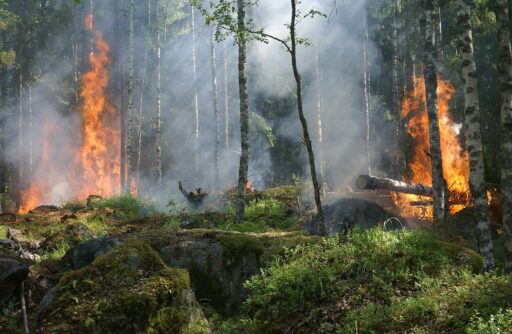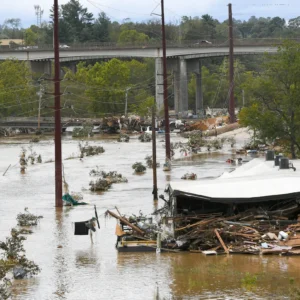The literary critic Stanley Fish has lamented that when poets are not taught in classrooms, they cease to exist. That’s extreme, but there’s some truth to it, and among modern American poets, a case in point is Robinson Jeffers. He’s rarely on syllabi, and it has been this way for a long time. Many believe he’s reactionary and bombastic, and, in his body of work, there’s evidence for this judgment. But at his best, Jeffers is a powerful Nature poet, especially in his descriptions of the central California coast. He’s well worth reading, studying, and learning from.
I’d like to share a poem by Jeffers that shows how interesting he is. It’s “Fire on the Hills,” from Thurso’s Landing and Other Poems, published in 1932:
The deer were bounding like blown leaves Under the smoke in front of the roaring wave of the brush-fire; I thought of the smaller lives that were caught. Beauty is not always lovely; the fire was beautiful, the terror Of the deer was beautiful; and when I returned Down the back slopes after the fire had gone by, an eagle Was perched on the jag of a burnt pine, Insolent and gorged, cloaked in the folded storms of his shoulders. He had come from far off for the good hunting With fire for his beater to drive the game; the sky was merciless Blue, and the hills merciless black, The sombre-feathered great bird sleepily merciless between them. I thought, painfully, but the whole mind, The destruction that brings an eagle from heaven is better than mercy.
The image of the bounding deer is familiar, not a promising first phrase, and I was curious whether Jeffers could do something with it. The simile “like blown leaves” appealed to me. Even as the deer dart and jump, they’re helpless, inanimate. There’s a scattering effect, and it’s colorful too. If the leaves are being blown around, they must have fallen from the trees, and, even as they bob in the air, they’ll soon settle on the ground.
The next line clarifies and expands the scene. The forest is on fire, and it’s near the deer, who are amid the smoke, making their escape. It’s a long verse line, drawn out by under/in front of/of, and by the moment or two it takes us to hear and process “the roaring wave,” which makes sense as an evocation of the advancing and curling walls of flame. The word “brush-fire” concludes the line, punctuated by a semi-colon.
The speaker makes his appearance at the start of line three. The scene, which seems to be unfolding even now, kindles a thought in him. “Smaller lives”: what are these, and their size, scale, and significance? “Caught” is another firm verb; it ends the line, with a period for punctuation.
That’s the first sentence, three lines. Then, line four, a generalization, in negative terms: the speaker is challenging the reader, or perhaps himself, to revise a view he held before he witnessed this scene. We might take for granted, he says, that beauty is always lovely, but it’s not.
“Terror” led me to expect that the speaker would dwell on his fear, for forest fires are frightening, as we know from the deer that are making their desperate getaway. But the shift to line five tells us it’s the terror the speaker knows is in the deer that’s beautiful to him, and he implies it should be to us. This speaker is making statements, assertions.
In line five, on the other side of the mid-line semi-colon, there’s a pause, and Jeffers calls attention to his return to the scene later. “Down the back slopes”: starting the line in this way accents the downward cast of the walk he took. He sees the fire has “gone by,” somewhat casual, not urgent, as if it has done its sauntering for the day.
Line six concludes with the eagle, America’s national bird. Tough, tight phrasing: “Was perched on the jag of a burnt pine.” “Jag” is a sharp projection, from late Middle English, to stab or pierce. It’s a word someone would use who knows about this terrain, who has it in his everyday vocabulary. The eagle isn’t highlighted for its grandeur, but for its insolence, its rude, disrespectful bearing and behavior, and for being “gorged,” having eaten a large amount of food greedily.
We feel the eagle’s pride: it does what it wants, it doesn’t care what others see or how they judge. There’s a sign of the eagle’s majesty, the cloak it wears, not wings, but “folded storms,” evoking the sweeping sound and motion in flight, flapping hard and fast at takeoff or at landing.
The speaker knows what has happened: the eagle glimpsed the fire from a far distance and travelled to it, seizing on the opportunity to catch the small lives of its prey in the open, exposed, vulnerable, amid the relentless “roaring wave” of fire. The sky is “merciless,” and the hills are colored blue and black.
Line 12 refers to the absence of mercy in the eagle. “Merciless,” repeated, means remorseless, no pity. The eagle, solemn and sober in appearance, is “sombre-feathered,” even funereal. That’s the outside. Inside, it’s merciless. This “great bird” is asleep. It has gotten what it wanted, it has killed, and it rests as if in weary contentment from a meal.
“Merciless Beauty”—that’s the title of a poem by Chaucer, which I suspect Jeffers is invoking to give a very old, many centuries, aura to this scene. He may also have in mind poems about eagles by Tennyson and Whitman, among others. But Jeffers has a rhetoric and perspective of his own. Scenes like this, of disruption in Nature, a creature capitalizing on it to slaughter others: this has transpired a near-infinite number of times in the past, and it’s occurring even as this poem is being written and read. Jeffers’s message is the recurrence of such scenes endlessly. That’s the hard-hearted truth.
As Jeffers closes, he reveals another “thought,” with the adverb “painfully” making prominent the hurt not in the killed creatures, but in him, his consciousness. “But the whole mind”: it’s not clear how this phrase functions grammatically. Perhaps the sense is: “this thought was painful to me even as it occupied my entire mind.”
The long final line is oracular, enigmatic. Is this a minor apocalypse that the speaker has apprehended and set out for us—heaven unleashing destruction on weak mortality below? Heaven, God, Nature: whatever almighty power exists, it could have shown mercy, allowing smaller lives to find safety and refuge.
Such mercy, however, would not be as pleasing as the destruction that takes place. There’s fire, fright, the predator, the defenseless. It’s good this way, says Jeffers. That’s the reality that in this fierce poem and others like it, he tells us we must face.
William E. Cain is Mary Jewett Gaiser Professor of English at Wellesley College, where he enjoys teaching courses on Ralph Waldo Emerson, Henry David Thoreau, and other American writers. His recent publications include essays on Edith Wharton and Ernest Hemingway.





